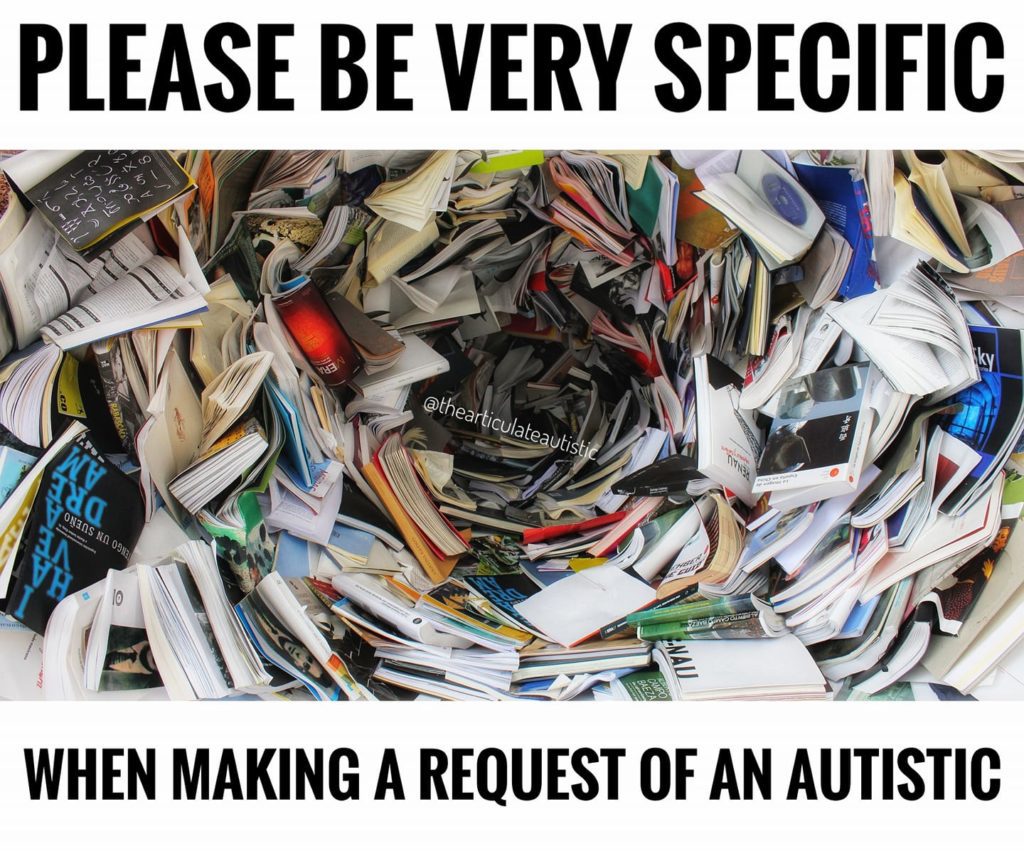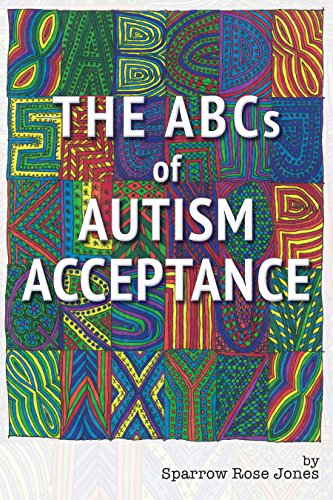Please Be Very Specific When Making a Request of an Autistic

“There’s dog poop on the floor.”
To a neurotypical person, this is a request. To an autistic person, this is a statement of fact.
My aunt said that to me once, and I said, “Oh, OK”, stepped around it, and kept walking.
I didn’t see the look on her face at the time, but I imagine it was something like this: 🤨
She then asked me to pick up said poop off the floor, and I did it. No problem.
Now, autistic folks, imagine this scenario from a neurotypical perspective. They believe they have just clearly told you to do something, and you looked at them, said “That’s nice”, and walked away.
Granted, that’s not what happened, but that’s how it looks.
Neurotypical folks, imagine this scenario from an autistic perspective. They believe you just made a statement of fact such as, “The sky is blue”. They agreed with you and walked away. Suddenly, they are very uncomfortable, but they don’t know why (many of us can sense your energy fluctuations), we turn around, and you’re angry.
This is baffling to us and also, in many cases, triggering.
This is a miscommunication. Nobody is trying to be lazy, rude, or mean.
(Article continues below.)
The best way to improve communication with your autistic loved one is to understand how your autistic loved one’s mind works! Intentions, motivations, and personal expressions (facial expressions or lack thereof, body language, etc.), are often quite different in autistic people than they are in neurotypical people.
Experience a better understanding of your autistic loved one by reading books about life from an autistic perspective as well as stories that feature autistic characters. You’ll have so many “Ah ha!” moments and start seeing your autistic loved one in a different light (and you’ll have a better understanding of their behaviors, which you may have been misinterpreting up until now).
Books I recommend for a better understanding of your autistic loved one:
NTs, when asking an autistic person to do something for you, be very specific. Instead of, “There’s dog poop on the floor”, say, “Will you get a paper towel and pick up the dog poop on the floor in the kitchen by the trash can?”
Instead of, “I think the mail is here”, say, “Will you go and get the mail out of the mailbox?”
Why SO specific, you ask? I mean, where else would the mail be but the mailbox? Isn’t that redundant and demeaning?
Not necessarily.
You see the photo I chose to go with this post? I didn’t choose it at random. That’s what our brains look like 90% of the time. Absolutely chock full and swirling at 500 miles per hour.
Your words have to get through all of that to get to us. So, multiple keywords (apparently, we’re the Internet 😄) help to make sure your request or question has created a clear enough picture in our head in order to understand and carry out the task.
It’s not lack of intelligence, it’s that we already have so much going on in our brains as it is!
Also, and this is especially important, questions and requests can trigger us, especially if we weren’t expecting it, or our routine was disrupted, or we were very deeply involved with a task.
Furthermore, if we’ve ever been yelled at or physically abused in our past, a statement followed by a feeling of expectation coming from another person can be quite scary.
It’s like we know something is expected of us, but we don’t know what, and our minds go blank trying to retreat from the anticipation of something bad happening.
Clear, specific instructions can be very calming and reassuring because we will be more likely to know exactly what to do the first time without having to ask questions or ask someone to repeat themselves (which, in the past, may have triggered an abusive response from others).
– Jaime A. Heidel
So, be specific. Be very specific. Maybe what you would even consider rudely specific, BUT, use your usual speaking voice. Avoid slipping into a condescending tone (which is actually quite challenging when you’re first learning how to do this) when explaining things or making requests.
A sing-song voice and a too-wide smile is scary, people, no matter what side of the neurological fence you’re on. 😉
One of the most common struggles in neurotypical-to-autistic communication is that autistic people can come across a purposefully rude. More often than not, we don’t have any idea why people get so upset with us. Click on the link below to learn more about why the autistic person in your life may appear to be harsh and unfeeling when that’s not their intention.
Follow me on Instagram.
Want downloadable, PDF-format copies of these blog posts to print and use with your loved ones or small class? Click here to become a Patreon supporter!











6 Responses
[…] in a recent post, we covered the absolute necessity of being specific when asking an autistic person to do […]
[…] been talking about being specific with autistic people, understanding that “why” is just a question to us, nothing more, and our inability to […]
[…] Are you looking for more help on communicating effectively with your autistic loved one? Click on the photo below to learn more about the importance of being specific when asking us to do something. […]
[…] (My aunt is featured a lot in these blog posts. She saved my life, I swear, and I’d pick up all the dog poop in the world for her. 😉) […]
[…] past blog posts, I’ve explained how utterly imperative it is to be very specific when requesting something of a person on the spectrum, and why, when autistic people explain things to neurotypical people, it can come across as rude […]
[…] Loved One Is Not Hurting Your Feelings out of Malice Yes, Autistic People Have Empathy! Please Be Very Specific When Making a Request of an Autistic The Real Reason Autistic People Struggle With Household […]